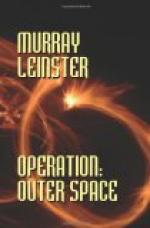Cochrane grinned.
“There’s a diamond-mine. There are herds of what people will call cattle. There’s food and riches. There’s scenery and adventure. There’s room to do things! Nobody could keep political office if he tried to keep his constituents from food and cash and adventure—even by proxy when they send expendable Cousin Albert out to see if he can make a living there. We’ve got to take reasonable precautions against germs, of course. We’ll have trouble enforcing them. But we’ll manage!”
Al called down from the control-room. The ship was sufficiently aligned, he thought, for their next stopping-place. He wanted Jones to charge the booster-circuit and flash it over. Jones went.
A little later there was the peculiar sensation of a sound that was not a sound, but was felt all through one. The result was not satisfactory. The ship was still in empty space, and the nearest star was still a star. There was a repetition of the booster-jump. Still not too good. Thereafter the ship drove, and jumped, and jumped, and drove.
Jamison came down to where Cochrane conducted business via communicator. He waited. Cochrane said:
“Dammit, I won’t agree! I want twelve per cent or I take up another offer!—What?”
The last was to Jamison. Jamison said uneasily:
“We found another planet. About Earth-size. Ice-caps. Clouds. Oceans. Seas. Even rivers! But there’s no green on it! It’s all bare rocks!”
Cochrane thought concentratedly. Then he said impatiently:
“The whiskered people back home said that life couldn’t have gotten started on all the planets suited for it. They said there must be planets where life hasn’t reached, though they’re perfectly suited for it. Make a landing and try the air with algae like we did on the first planet.”
He turned back to the communicator.
“You reason,” he snapped to a man on far-away Earth, “that all this is only on paper. But that’s the only reason you’re getting a chance at it! I’ll guarantee that Jones will install drives on ships that meet our requirements of space-worthiness—or government standards, whichever are strictest—for ten per cent of your company stock plus twelve per cent cash of the cost of each ship. Nothing less!”
He heard the rockets make the louder sound that was the symptom of descent against gravity.
The world was lifeless. The ship had landed on bare stone, when Cochrane looked out the control-room ports. There had been trouble finding a flat space on which the three landing-fins would find a suitable foundation. It had taken half an hour of maneuvering to locate such a place and to settle solidly on it. Then the look of things was appalling.
The landing-spot was a naked mass of what seemed to be basalt polygons, similar to the Giants’ Causeway of Ireland back on Earth. There was no softness anywhere. The stone which on other planets underlay soil, here showed harshly. There was no soil. There was no microscopic life to nibble at rocks and make soil in which less minute life could live. The nudity of the stones led to glaring colors everywhere. The colors were brilliant as nowhere else but on Earth’s moon. There was no vegetation at all.




